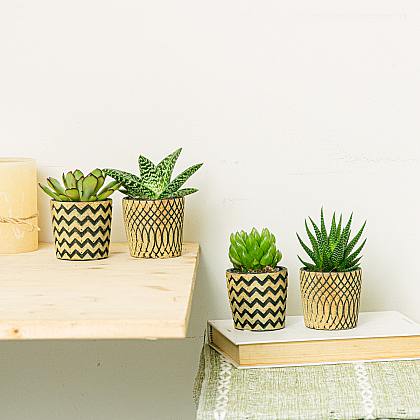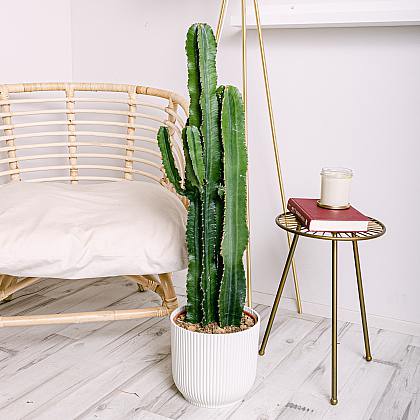Improve your well-being at home with these plants that effectively combat non-ionizing radiation
Plants are not only a decorative addition to our home, but they can also significantly improve our health and well-being
Plants are not only a decorative addition to our home, but they can also significantly improve our health and well-being. In particular, they can help combat the non-ionizing radiation emitted by electronic devices, such as mobile phones and computers. In this article, we'll explore how plants work to improve well-being at home and introduce some species that can protect us against electromagnetic radiation. Discover how the snake plant, Christmas cactus, bamboo palm, and spider plant can make your home healthier and more harmonious.
The Importance of Combating Non-Ionizing Radiation
Non-ionizing radiation is a type of energy that is emitted from various electronic and technological devices, such as mobile phones, Wi-Fi routers, televisions, and others. Although it is not as dangerous as ionizing radiation, it can have negative health effects if exposed to it for long periods of time. The effects include fatigue, headaches, sleep disturbances, and even concentration problems. Therefore, it is important to combat this radiation to improve well-being at home. A natural and effective way to do this is through the use of plants. Plants have the ability to absorb and filter air, making them a natural shield against non-ionizing radiation. In addition, many plants also have air-purifying properties and help reduce carbon dioxide levels in the home. Importantly, plants don't completely eliminate non-ionizing radiation, but they can help reduce it and improve overall well-being in the home. In summary, combating non-ionizing radiation is important for maintaining good health and well-being at home. Plants are a natural and effective option to protect against this form of energy and improve air quality at home.
How Plants Work to Improve Well-Being
Plants have the ability to improve well-being in our home in a variety of ways. One of the main ways they accomplish this is through air purification. Plants absorb carbon dioxide and release oxygen during the process of photosynthesis, which helps improve the quality of the air we breathe. In addition, many plants have the ability to filter toxins and harmful substances present in the environment, such as formaldehyde, benzene, and trichloroethylene. These substances are common in household chemicals and can have negative effects on our long-term health.
In addition to purifying the air, plants can also help reduce stress and improve mood. Scientific studies have shown that being surrounded by plants can reduce levels of cortisol, a stress-related hormone. The presence of plants in our environment can also increase feelings of calm and relaxation, contributing to greater emotional well-being.
Another major benefit of having plants at home is their ability to regulate the humidity in the air. When transpiring, plants release water vapor, which can help maintain optimal humidity levels in the environment. This is especially beneficial during the dry winter months or when using heating or air conditioning systems, which can dry out the air and cause respiratory problems.
In short, plants improve well-being at home by purifying the air, reducing stress, and improving the quality of the environment. Incorporating plants into our home not only allows us to enjoy their natural beauty, but it also provides us with numerous benefits for our overall health and well-being.
The Snake Plant: A Natural Shield Against Electromagnetic Radiation
The snake plant, also known as Sansevieria, is renowned for its ability to act as a natural shield against electromagnetic radiation. This plant has long, pointed leaves that create a positive energy field around it, which helps neutralize the negative effects of non-ionizing radiation. Sansevieria absorbs electromagnetic waves and transforms them into energy that is beneficial to the environment. In addition, this plant is also able to purify the air by removing toxins such as formaldehyde and benzene, releasing fresh oxygen into the environment. This makes it an ideal choice for placing near electronic devices such as computers, televisions, or mobile phones, which emit high levels of electromagnetic radiation. In addition to its radiation-protective properties, the snake plant is very hardy and easy to care for, making it perfect for those who have no gardening experience. In short, having a snake plant at home can help us create a healthier environment by protecting us from electromagnetic radiation and purifying the air we breathe.
The Christmas Cactus: An Air-Purifying Plant That Protects Against Non-Ionizing Radiation
The Christmas Cactus is a plant that not only adds beauty to our home, but also offers benefits to improve well-being. This plant is known to be an excellent air purifier, as it absorbs harmful substances such as formaldehyde and benzene, common in cleaning products and synthetic materials present in our homes. In addition, the Christmas cactus has the ability to protect against non-ionizing radiation. This radiation comes from electronic devices such as mobile phones, computers, and Wi-Fi routers, and can have negative effects on our long-term health. The Christmas cactus acts as a natural shield by absorbing some of this electromagnetic radiation and thus reducing its impact on our environment. By having this plant at home, we will not only be enjoying a cleaner and healthier environment, but we will also be protecting ourselves from the possible harmful effects of non-ionizing radiation. Importantly, the Christmas cactus is easy to care for, so it doesn't require great efforts to keep it in good condition. In summary, the Christmas cactus is an ideal choice for those looking to improve the air quality in their home and protect themselves against non-ionizing radiation.
The Bamboo Palm: An Ornamental Plant With Great Health Benefits
The bamboo palm is an ornamental plant that, in addition to being a decorative element in the home, offers great health benefits. This plant helps improve air quality by absorbing toxic gases such as formaldehyde, benzene, and carbon monoxide. In addition, its ability to produce oxygen makes it an excellent choice for purifying indoor air. Bamboo palm also has relaxing properties and can help reduce stress and anxiety. This is because it releases phytoncides, natural chemicals that have a calming effect on the human body. In addition, this plant can also help regulate air humidity, which is especially useful in dry or centrally heated environments.
Another benefit of the bamboo palm is that it is very easy to care for. Unlike other plants, it doesn't require much maintenance and can survive in low light and water conditions. However, it is important to note that bamboo palm can be toxic to pets, so it should be kept out of the reach of pets.
In short, bamboo palm is an ornamental plant with great health benefits. It is an excellent option for improving indoor air quality, reducing stress, and regulating ambient humidity. In addition, its easy care makes it a practical and economical option for any home.
The Spider Plant: An Easy-to-Care Option to Protect Against Electromagnetic Radiation
The spider plant is an easy-to-care option to protect against electromagnetic radiation. This plant, also known as Chlorophytum comosum, is one of the most popular houseplants due to its easy maintenance and health benefits. In addition, according to recent studies, this plant can help combat the harmful effects of non-ionizing radiation emitted by electronic devices such as mobile phones, computers, and televisions.
The spider plant is able to absorb chemical compounds found in the air and reduce indoor pollution levels. It also helps increase humidity in the environment, which can relieve symptoms of respiratory illnesses such as asthma or bronchitis. But what makes this plant special is its ability to absorb electromagnetic waves emitted by electronic devices.
The spider plant has long, thin leaves that act as natural antennae to capture electromagnetic waves. As the waves are absorbed by the plant, they are neutralized and converted into harmless energy for humans. In addition, this plant is very easy to care for and requires little maintenance. It is hardy to most environmental conditions and can grow both indoors and outdoors.
In conclusion, if you're looking for an easy-to-care option to protect against electromagnetic radiation, the spider plant is an excellent choice. In addition to its health benefits, this plant can help you maintain a healthier, pollutant-free home.
Conclusion: Create a Healthier Home with These Natural Plants
Conclusion: Create a Healthier Home with These Natural Plants
In summary, plants can play an important role in improving well-being in the home and protecting against non-ionizing radiation. The electromagnetic radiation emitted by electronic devices can have negative effects on our health, but fortunately, we can count on the help of some plants to counteract these effects.
The snake plant is a natural shield against electromagnetic radiation and can absorb much of the harmful waves emitted by electronic devices. In addition, the Christmas cactus is not only an air-purifying plant, but also acts as a shield against non-ionizing radiation. Its ability to absorb and neutralize toxic chemicals makes it an ideal choice for improving the air quality in our home.
The bamboo palm, in addition to being a beautiful ornamental plant, also has great benefits for our health. This plant is able to release oxygen during the night, which improves air quality and promotes better sleep. In addition, its dense foliage helps to reduce ambient noise, thus creating a calmer and more relaxing environment.
Finally, the spider plant is an easy option to care for and also protects us against electromagnetic radiation. This plant has the ability to absorb and neutralize harmful waves emitted by electronic devices, making it an excellent choice for those looking for a simple yet effective solution.
In conclusion, by incorporating these natural plants into our home, we can create a healthier environment and protect ourselves against the negative effects of non-ionizing radiation. Not only do they improve air quality and promote better sleep, but they also act as natural shields against harmful electromagnetic waves. So don't hesitate to include these plants in your home and enjoy their benefits for overall well-being.
In conclusion, plants are not only a decorative way to beautify our home, but they can also improve our health and well-being. Combating non-ionizing radiation is important to maintain a safe environment in our home and these plants can be a natural and effective solution. In addition, caring for these plants can be a relaxing and rewarding activity. It's important to note that these plants aren't a definitive solution to protect against non-ionizing radiation, but they can help reduce its impact. We invite readers to do further research on the topic and consider including these plants in their home to improve their well-being. It is also important to remember that excessive use of electronic devices can have negative effects on our health, so it is necessary to take additional steps to protect ourselves against electromagnetic radiation


